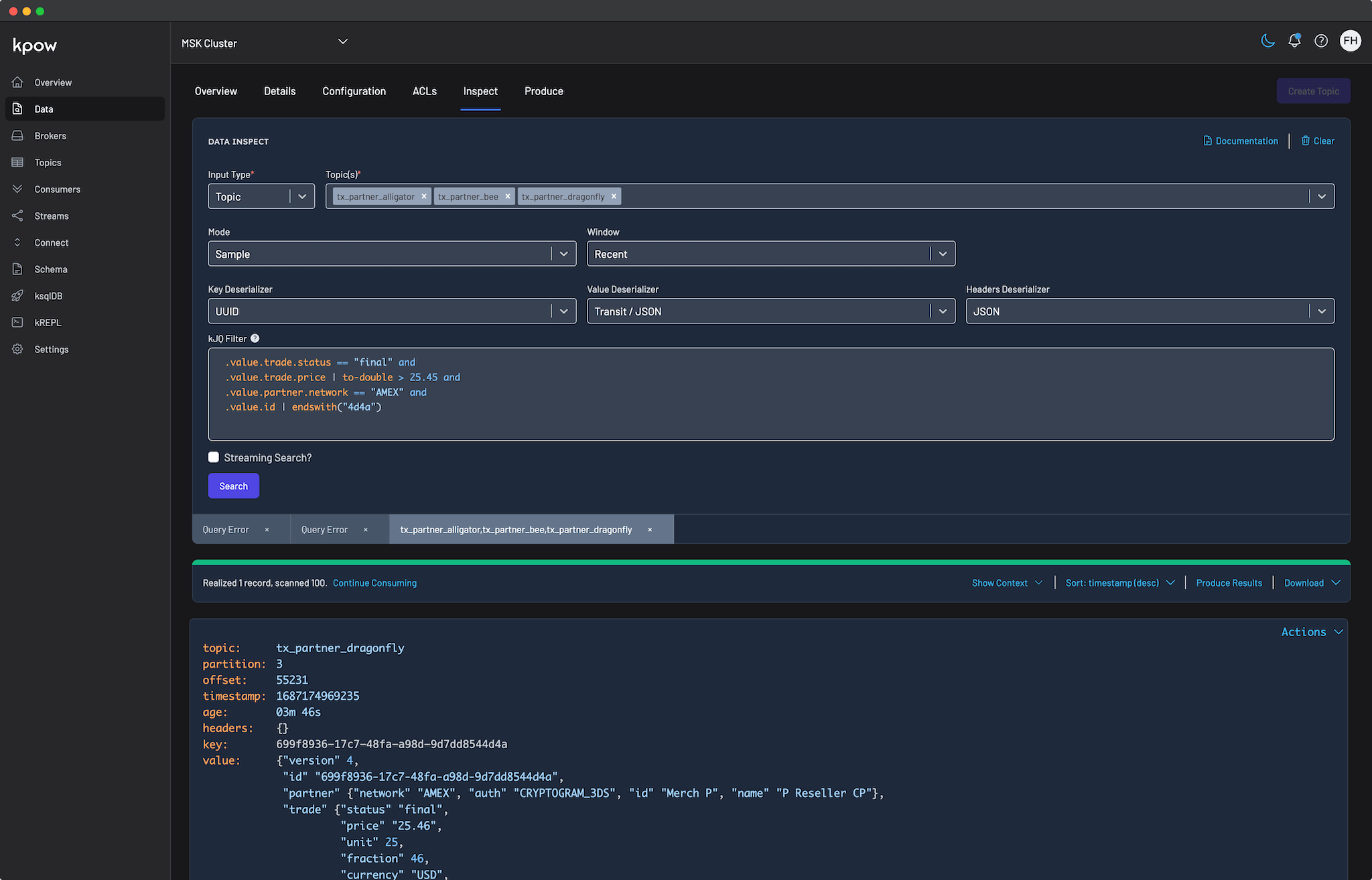Overview
In a distributed system like Apache Kafka, data is partitioned and replicated across multiple brokers to ensure high availability and fault tolerance. A partition is considered an under-replicated partition (URP) when the number of in-sync replicas (ISRs) falls below the configured replication factor. This scenario can arise from various issues, including broker failures, network partitions, or high load on specific brokers.
The presence of URPs is a significant concern as it indicates a degradation in your topics' fault tolerance. If another broker fails before the cluster recovers, you risk permanent data loss. A key challenge in Kafka management is accurately detecting these URPs in real-time, especially during common operational events like a broker failure. Standard monitoring methods can sometimes lag, creating a temporary but dangerous blind spot where a cluster appears healthy even though its resilience has been compromised.
This is precisely the challenge that Kpow's enhanced URP detection is designed to solve. By providing a more accurate and immediate assessment of your cluster's true fault tolerance, this feature delivers significant benefits. It gives you the confidence to act quickly on reliable data, the ability to proactively mitigate risks before they escalate, and ultimately, the power to ensure the resilience and durability of your critical data pipelines.
💡 Enhancement of URP detection is implemented in Release 94.5. For an overview of all the changes, check out the release note: Release 94.5: New Factor House docs, enhanced data inspection, and URP & KRaft improvements.
About Factor House
Factor House is a leader in real-time data tooling, empowering engineers with innovative solutions for Apache Kafka® and Apache Flink®.
Our flagship product, Kpow for Apache Kafka, is the market-leading enterprise solution for Kafka management and monitoring.
Explore our live multi-cluster demo environment or grab a free Community license and dive into streaming tech on your laptop with Factor House Local.

Enhanced calculation for more accurate health monitoring
Ensuring the fault tolerance of your Kafka clusters requires a precise and accurate count of under-replicated partitions. A challenging but common operational scenario can arise where a broker becomes unavailable, yet the overall cluster health status does not immediately reflect this change. This can mask a critical degradation in data durability, leading operations teams to believe their cluster is healthier than it actually is. Making decisions based on this incomplete information can delay necessary interventions.
To provide a more reliable and trustworthy view, Kpow has enhanced its calculation for under-replicated partitions. Instead of calculating replication status by iterating through each broker—a method that can be incomplete if a broker is offline and unreachable—our new calculation iterates directly through every topic-partition defined in the cluster.
This partition-centric approach provides a more comprehensive and authoritative view of the cluster's state. It is precisely this change that allows the system to correctly detect partitions with fewer in-sync replicas than the configured replication factor, even when brokers are offline and not reported by the AdminClient.
This enhancement ensures that Kpow's health monitoring is a precise reflection of your cluster's real-time condition. It gives you the confidence to trust the metrics you see and act decisively to investigate and resolve replication issues, thereby maintaining a resilient and robust system.
Surfacing URP details in Kpow
This vital health information, now powered by our more accurate calculation, continues to be clearly presented on both the Brokers and Topics pages of the user interface. We've retained this dual perspective as it remains essential for diagnosing problems from different angles—whether you're investigating a single problematic broker or assessing the health of a critical application's topic.
On both pages, summary statistics displays the total number of under-replicated partitions. If this count is greater than zero, it serves as an immediate visual alert. A detailed table automatically appears, listing all affected topics along with their specific URPs. This allows you to quickly identify which topics are at risk and gather the necessary context to restore full replication.
On the Brokers Page:

On the Topics Page:

To further strengthen monitoring and alerting capabilities, new Prometheus metrics have been introduced to track under-replicated partitions. These metrics integrate seamlessly with your existing observability stack and provide more granular insights for automated alerting and historical trend analysis:
- broker_urp: The total number of under replicated topic partitions belonging to this broker.
- topic_urp: The total number of under replicated partitions belonging to this topic.
- topic_urp_total: The total number of under replicated partitions of all topics in the Kafka cluster.
Conclusion
Accurate and timely detection of under-replicated partitions (URPs) is fundamental to maintaining a resilient and reliable Apache Kafka cluster. With its enhanced calculation, Kpow provides a more precise and immediate understanding of your cluster's health by correctly identifying replication issues, particularly in scenarios involving broker failures. This enhanced detection, combined with detailed visibility in the Kpow UI and new Prometheus metrics for automated alerting, empowers you to proactively address replication issues, mitigate the risk of data loss, and ensure the continuous high performance of your real-time data pipelines. This feature update reaffirms Kpow's commitment to providing comprehensive and intuitive tooling for Kafka management and monitoring.